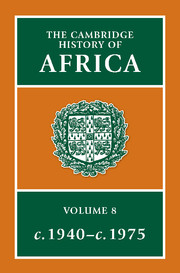Book contents
- Frontmatter
- Introduction
- 1 The Second World War: prelude to decolonisation in Africa
- 2 Decolonisation and the problems of independence
- 3 Pan-Africanism Since 1940
- 4 Social and cultural change
- 5 The economic evolution of developing Africa
- 6 Southern Africa
- 7 English-speaking West Africa
- 8 East and Central Africa
- 9 The Horn of Africa
- 10 Egypt, Libya and the Sudan
- 11 The Maghrib
- 12 French-speaking tropical Africa
- 13 Madagascar
- 14 Zaire, Rwanda and Burundi
- 15 Portuguese-speaking Africa
- Bibliographical essays
- Bibliography
- Index
- References
12 - French-speaking tropical Africa
Published online by Cambridge University Press: 28 March 2008
- Frontmatter
- Introduction
- 1 The Second World War: prelude to decolonisation in Africa
- 2 Decolonisation and the problems of independence
- 3 Pan-Africanism Since 1940
- 4 Social and cultural change
- 5 The economic evolution of developing Africa
- 6 Southern Africa
- 7 English-speaking West Africa
- 8 East and Central Africa
- 9 The Horn of Africa
- 10 Egypt, Libya and the Sudan
- 11 The Maghrib
- 12 French-speaking tropical Africa
- 13 Madagascar
- 14 Zaire, Rwanda and Burundi
- 15 Portuguese-speaking Africa
- Bibliographical essays
- Bibliography
- Index
- References
Summary
French colonisation in tropical Africa resulted in the creation of 14 new countries, all of which became independent in 1960, with the exception of Guinea which had become a sovereign state two years earlier. Together these countries – namely Bénin, Cameroun, the Central African Republic, Chad, Congo, Gabon, Guinea, the Ivory Coast, Mali, Mauritania, Niger, Senegal, Togo and Upper Volta – cover a vast area of over three million square miles, but their combined estimated population in 1975 was only just over 50 million. Thus though they are larger in size than Europe less the Soviet Union, they have only a tenth of its population.
To discuss francophone tropical Africa as if it were a unit is misleading. Though all the states that comprise it were colonised by France and still use French as their official language, these facts cannot disguise the many differences among them that have become much more pronounced since independence. Some countries, such as Chad and Upper Volta, suffered during the period under consideration from their land-locked position and scarce resources, which resulted in low investment and a slow, and sometimes negligible rate of economic growth. Others like Gabon and the Ivory Coast, both relatively rich in agricultural and mineral resources, enjoyed rapid economic growth. Their coastal location and good port facilities helped them to sustain an active foreign trade and to attract workers from poorer neighbouring states. Guinea, by contrast, though rich in mineral and agricultural resources and located on the Atlantic Ocean, had a government which throughout our period proved incapable of harnessing these advantages to the benefit of its people.
- Type
- Chapter
- Information
- The Cambridge History of Africa , pp. 611 - 673Publisher: Cambridge University PressPrint publication year: 1984
References
- 2
- Cited by

